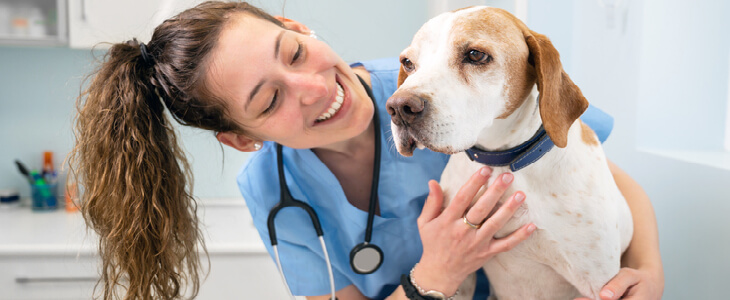A key consideration in the purchase and sale of a veterinary practice is valuing goodwill. Unlike tangible assets such as real estate, furnishings, and equipment, goodwill is an intangible asset that can be hard to quantify. Whether you are the buyer or seller, it takes an experienced veterinary attorney to arrive at a proper valuation of the practice’s goodwill.
At Mahan Law, we provide comprehensive legal services to veterinarians around the country. Our legal team is well-versed in practice valuations, including goodwill, and regularly guides our clients through successful veterinary practice transitions. Given that the valuing goodwill of a veterinary practice is unlike other businesses, it is essential to have trustworthy advice. Contact our office today to get started.
Understanding Valuing of Goodwill for a Veterinary Practice
Goodwill is an intangible asset related to the purchase of one business by another, such as a veterinary practice. Specifically, goodwill is the amount the purchaser pays for the target practice over the fair market value (FMV) of its net assets – FMV is the price an asset would sell for on the open market.
Goodwill is derived from:
- Brand name
- Reputation
- Solid patient base
- Loyal and highly skilled employee
- Good customer relations
- Vendor relationships
- Proprietary technology/confidential business information
- Future sales projections
Although goodwill is an intangible asset, it may be worth more than the target practice’s tangible assets. Because goodwill is the essence of a veterinary practice’s value to its clients and employees, it is invaluable to the buyer. In short, it is easier to maintain goodwill than to establish it because goodwill takes time to build. Ultimately, purchasing a practice that has established goodwill in the community can give the owner a competitive advantage.
How Is the Value of Goodwill Determined?
Although goodwill is a key factor in sales negotiations, determining its value can be complicated – there is no “set price” for goodwill. Generally, goodwill is reflected in the amount in excess of the veterinary practice’s net assets. If the practice is well-established, goodwill may yield a price that is higher than the practice’s physical assets may be worth. There are several complex methods for calculating goodwill, including:
- Average profit method
- Weighted average profit method
- Capitalization method
- Annuity method
- Super-profit method
There is a relatively straightforward way to evaluate goodwill. Subtract the net FMV of identifiable assets and liabilities from the purchase price of the practice:
Goodwill = Purchase Price – (assets – liabilities)
For example, if Veterinary Practice A acquires Practice B for $1 million, and Practice B has an FMV of $900,000, then Practice B has goodwill worth $100,000. Given that sellers and buyers have competing interests in valuing goodwill, it is essential to have a highly capable veterinary attorney involved in the negotiation process.
Other Considerations When Valuing Goodwill
In determining the value of a veterinary practice’s goodwill there is an important difference between enterprise (practice) goodwill and professional (personal) goodwill.
The enterprise goodwill value is based on the net income generated by the practice, not on the practice’s reputation, client lists, or geographic area in which it operates. While these attributes may contribute to profitability, enterprise goodwill is only measured by the profit that the practice generates. Generally, 70 to 80 percent of the practice’s value will derive from enterprise goodwill.
Practice at Retirement
The practice’s profitability not only affects the owner’s return on investment over the years of operation but also weighs heavily on the sale price of the practice at retirement. An important consideration when purchasing a veterinary practice is whether the seller’s personal goodwill can be effectively transferred to the new owner. That transfer depends on whether the professional goodwill belongs to the individual owner, the practice, or a combination of both.
For example, in a one-veterinarian practice in which the owner has relationships with the clients and treats all the animals, the reputation of the practice is directly related to that doctor. Therefore, it is essential that the owner transfer their personal goodwill by introducing the buyer to clients and convincing them that their pets will be in good hands.
By contrast, in a veterinary clinic with multiple owners or veterinarians, clients might routinely deal with various vets and will more readily relate to the practice’s brand identity. If one owner or veterinarian retires, clients will likely continue using the practice’s services.
How Mahan Law Can Help
Our firm regularly works with new veterinarians who are considering buying a practice and established veterinary professionals looking for growth opportunities. By collaborating with a respected network of valuation experts around the country with knowledge of regional markets, we work to arrive at the fair market value of veterinary practices and determine the value of goodwill. Above all, we will always work in your best interests and help you engage in a successful transaction.
Contact An Experienced Veterinary Attorney to Help With Valuing Goodwill Today!
Buying or selling a veterinary practice may be the single largest financial transaction that you undertake during your career. Whether you have already worked to establish the goodwill of your practice or your need assistance determining the value of a target practice’s goodwill, it is wise to have the advice and guidance of an experienced veterinary attorney. Contact our office today for a confidential consultation.
Mahan Law helps their clients with valuing goodwill of a veterinary practice throughout the United States including the states of Florida, Ohio, Kentucky, and Indiana.

